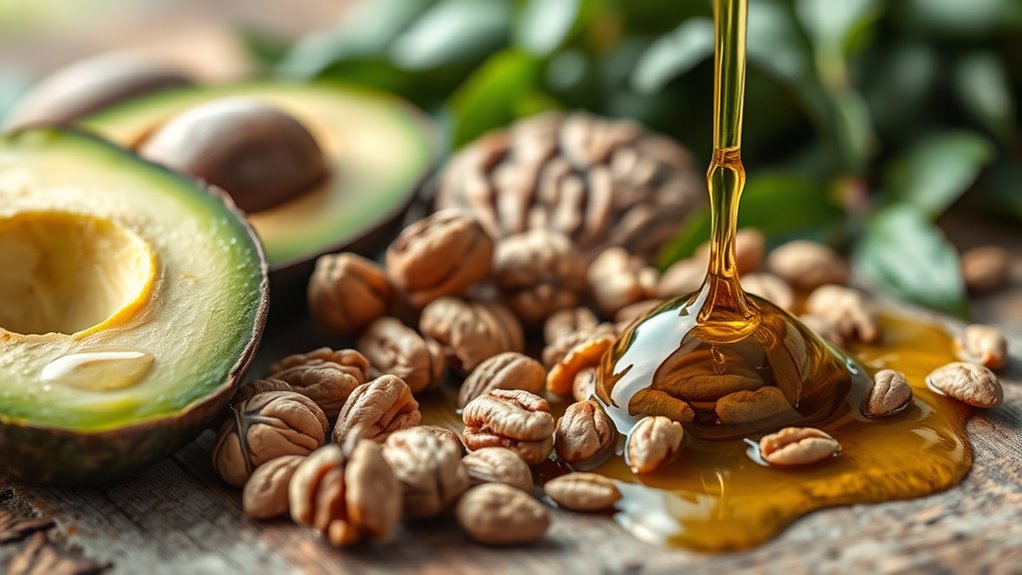To keep your brain healthy, focus on key nutrients like folate, which supports DNA repair and neuroprotection, and minerals such as iron, zinc, and magnesium that boost cognition and mood. Choline aids brain development and memory, while antioxidants from fruits and vegetables help prevent damage caused by free radicals. Healthy fats, especially omega-3s from fish and nuts, are essential for nerve function and cognitive decline prevention. Explore more to discover how these nutrients work together to enhance your brain health.
Key Takeaways
- Adequate folate supports DNA repair, neuroprotection, and reduces homocysteine levels, essential for healthy brain function.
- Minerals like iron, zinc, and magnesium are crucial for oxygen transport, synaptic function, and mood regulation.
- Choline promotes neural development, memory, and gene expression, vital for lifelong cognitive resilience.
- Antioxidants neutralize free radicals, preventing oxidative damage and supporting neurodegeneration prevention.
- Healthy fats, especially omega-3 fatty acids, maintain neuronal membrane integrity and facilitate rapid nerve signaling.
The Role of Folate in Brain Function and Neuroprotection

Folate plays a crucial role in maintaining healthy brain function and protecting neural tissue from damage. When you’re deficient in folate, your risk of neurodegenerative disorders and mental health issues rises because DNA repair processes, like uracil excision repair, become impaired. This deficiency also elevates plasma homocysteine levels, which can disrupt brain chemicals and hinder hippocampal neurogenesis, affecting memory and mood. Animal studies show that lack of folate leads to memory problems and behavioral despair. The enzyme UNG helps repair brain tissue after damage and relies on adequate folate levels for neuroprotection. Additionally, genetic factors affecting DNA repair can worsen neuronal dysfunction when folate is deficient, highlighting how essential this nutrient is for safeguarding your brain at the molecular, cellular, and behavioral levels.
Essential Minerals and Their Impact on Cognitive Health

Essential minerals like iron, zinc, and magnesium play a crucial role in supporting cognitive health by regulating key neural processes. Iron is vital for oxygen transport, helping deliver oxygen to your brain, and is a core part of enzymes that produce energy for neurons. Adequate iron improves your memory, attention, and problem-solving skills, while deficiency can impair cognition, especially in children. Zinc supports normal brain function, aiding in synaptic plasticity and neuron communication, which are essential for learning and memory. Zinc deficiency may lead to cognitive decline and mood issues. Magnesium is key for nerve transmission and neuromuscular coordination, also helping regulate stress and mood. A lack of magnesium increases the risk of depression and anxiety, and it offers protection against neurodegenerative diseases. Recent advances in AI Entertainment are enhancing research into nutritional impacts on brain health, promising new ways to prevent cognitive decline. Additionally, understanding the relationship between automation and neuroscience can help develop targeted nutritional interventions for mental health. Eating foods like leafy greens, nuts, and shellfish can help maintain optimal mineral levels.
Choline: A Key Nutrient for Brain Development and Memory

Choline is an essential nutrient that plays a central role in brain development and memory. It supports neural progenitor cells in the fetal hippocampus, aiding membrane synthesis and methylation critical for brain growth. This methylation influences gene expression, affecting proteins involved in learning and memory. When pregnant women consume enough choline, it enhances neurogenesis and can lead to lasting improvements in their child’s memory functions. Choline also supports the differentiation, migration, and proliferation of neural cells during key developmental stages. Additionally, it helps maintain lipid metabolism and liver health, indirectly benefiting brain function. Studies show prenatal choline supplementation improves memory into adulthood and can prevent age-related cognitive decline. Overall, choline’s role is essential for prime brain development and lifelong cognitive health. Recognizing the importance of nutritional balance in early development further underscores the need for adequate choline intake. Advances in heat pump technology can help reduce energy costs for households, indirectly supporting the resources needed for proper nutrition. Furthermore, ensuring adequate intake of nutrients like choline is a key aspect of holistic health strategies that promote cognitive resilience throughout life. Recent research highlights that brain-supporting nutrients are vital for maintaining mental clarity and function across the lifespan.
Antioxidants and Their Role in Preventing Neurodegeneration

Antioxidants play a pivotal role in safeguarding your brain against the damaging effects of oxidative stress, which is a key factor in neurodegenerative diseases. They neutralize reactive oxygen species (ROS) and free radicals, preventing cellular damage. By boosting your brain’s own defenses—like enzymes such as superoxide dismutase (SOD)—antioxidants help maintain oxidative balance. They also reduce markers like malondialdehyde (MDA), indicating less lipid peroxidation, and increase total antioxidant capacity (TAC), supporting overall health. Consuming foods rich in polyphenols, carotenoids, and vitamins C and E provides natural protection. Understanding oxidative stress is crucial for developing effective strategies to protect brain health. Incorporating antioxidant-rich foods or supplements can be an essential step in preventing neurodegeneration. Recognizing the importance of oxidative balance can further enhance efforts to maintain cognitive function and overall neurological health. Additionally, antioxidant capacity can be influenced by lifestyle factors such as diet, exercise, and exposure to environmental toxins. Moreover, ongoing research underscores the significance of AI security measures to monitor and mitigate vulnerabilities in AI systems that could impact health-related technologies. Ensuring lifestyle choices support antioxidant defenses is also an important aspect of holistic brain health.
The Importance of Healthy Fats for Cognitive Enhancement

Since the brain is composed of about 60% fat, consuming healthy fats is essential for maintaining and enhancing cognitive function. Neuronal membranes are mainly made of unsaturated fatty acids, which support communication between brain cells. Myelin sheaths, insulating nerve fibers, are also rich in fats, facilitating rapid signal transmission. Including sources like fatty fish, walnuts, and flaxseeds provides omega-3s, especially DHA, vital for brain structure and reducing cognitive decline. Additionally, essential fatty acids are crucial for synaptic plasticity, which underpins learning and memory processes. Maintaining a balanced ratio of omega-3 to omega-6 fats supports ideal neuronal function. Dietary patterns like the Mediterranean diet, rich in healthy fats, have been shown to promote better cognition and lower dementia risk, emphasizing the importance of quality fats for brain health. Furthermore, dietary fat quality influences inflammation levels, which can affect cognitive health over time. Proper intake of healthy fats can also help combat oxidative stress, further protecting brain cells from damage. Incorporating mindful fat consumption can further optimize brain function and overall mental well-being.
Frequently Asked Questions
How Do Nutrient Deficiencies Affect Long-Term Brain Health?
You might not realize it, but nutrient deficiencies can harm your long-term brain health. When you’re low on essential nutrients like iron, B12, folate, or omega-3s, you risk developing cognitive decline, memory problems, and even neurodegenerative diseases like Alzheimer’s. These deficiencies can also impact your mood and mental well-being over time. By maintaining a balanced diet rich in these nutrients, you help protect your brain’s structure, function, and overall health for years to come.
Can Diet Alone Reverse Cognitive Decline?
You might wonder if diet alone can reverse cognitive decline, but the truth is, it’s not that simple. While eating a healthy, balanced diet like the MIND diet, rich in berries, fish, and whole grains, can slow or delay decline, it’s unlikely to fully reverse existing issues. Combining good nutrition with exercise, stress management, and other healthy habits offers the best chance for supporting long-term brain health.
Are There Specific Supplements Proven to Boost Memory?
You’re wondering if specific supplements can boost your memory. While some, like omega-3s, B vitamins, and natural compounds such as L-theanine and curcumin, show promise, scientific evidence remains inconclusive. Supplements may help slow age-related decline or improve mild cognitive issues, but results vary. Before trying any, you should consult your healthcare provider, as effects depend on individual factors and supplement quality. More research is needed to confirm their true benefits.
How Quickly Can Dietary Changes Improve Cognitive Function?
You’re wondering how fast dietary changes can boost your cognition. Research shows that significant improvements generally take years, especially with diets like Mediterranean or DASH. Short-term effects, under six months, are limited and mostly affect specific areas like executive function or episodic memory. For meaningful, lasting cognitive benefits, consistent, long-term dietary adherence over several years is key, especially if you’re aiming to prevent decline or improve overall brain function.
What Is the Optimal Intake of These Nutrients for Brain Health?
You should aim for a balanced intake of key nutrients to support your brain health. Eat fatty fish like salmon twice a week for omega-3s, include leafy greens and berries daily for vitamins and antioxidants, and consume whole grains regularly for steady energy. Stay hydrated with 2-3 liters of water daily, and balance your diet with healthy fats, proteins, and micronutrients to optimize cognitive function and protect your brain.
Conclusion
As you nourish your brain with these essential nutrients, imagine your mind as a vibrant garden, each element working together to keep your thoughts sharp and memories clear. When you give your brain the right fuel—folate, minerals, choline, antioxidants, and healthy fats—you’re planting seeds of clarity and resilience. Tend to this garden daily, and watch your mental landscape flourish with vitality, strength, and endless possibilities for growth.









